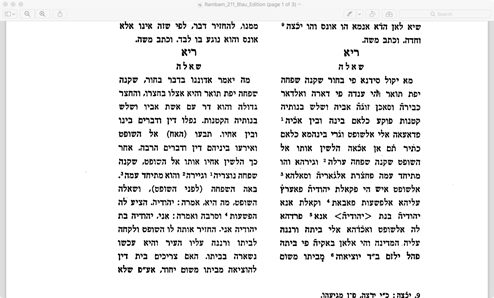Source 5: A Legal Query to Moses Maimonides
Twelfth century. Judeo-Arabic.

Partially translated from the Judeo-Arabic by Craig Perry in “Conversion as an Aspect of Master-Slave Relationships in the Medieval Jewish Community,” in Contesting Inter-Religious Conversion in the Medieval World, ed. Yaniv Fox and Yosi Yisraeli (London: Routledge, 2016), 135–59. Original text from Moses Maimonides, Responsa of Maimonides, ed. Joshua Blau, 4 vols. (Jerusalem: Hierosolymis Mekize Nirdamim, 1986). This translation CC BY-NC-ND 4.0.
Query, no. 211
Question: What does our master say in the matter of a young man who purchases a slave women who is a “beautiful captive” [see Deuteronomy 21:10-14] and she is with him in his house and there are many people in the house (lit: ‘the house is large.’). His father’s wife and her three small daughters live in the house. Then there was an argument between the young man and his brother. The brother summoned his sibling to the judge and there was a big argument between the two of them. Subsequently his brother informed on him to the [Muslim] judge that he had purchased a Christian maidservant, converted her (to Judaism), and secludes himself with her.
The slave girl appeared (before the judge). The judge asked what she was. She said, ‘I am a Jew.’ The judge suggested that she convert to Islam. She rejected (this notion) and said: ‘I am a Jew. I am the daughter of a Jewish woman.’ The judge returned the slave girl to him and he took her to his house. The city gossiped about him. Currently, the slave girl remains in his house…
Must the court force her out of his house because of this even though he [should not] seclude [himself] with her? As it is said: ‘You shall be clear before the Lord and before Israel’ [Numbers 32:22]. And what do we say in regards to his father’s wife who is with him in the house? Must we not remove (the enslaved woman) from his possession? If the court must remove her, in what manner is she to be removed? For, what options do we have since we have not found that this is forbidden? Rather, (this is either) unmarried seclusion or seclusion with a non-Jew. How can we forbid her from dwelling in his house? Is the law on her side, or not? Teach us, Rabbi, and may your reward be multiplied by Heaven.
[In his response, Moses Maimonides instructs that the slave-owner should either send the enslaved woman away, or free her and marry her.]
Discussion Questions
- What are the different conflicts apparent or implied in this court deposition?
- What is the significance of one brother’s decision to inform on his sibling to a Muslim judge for the latter’s conversion of an enslaved woman to Judaism?
- Does the query author think that the enslaved woman telling the truth to the judge?
Related Primary Sources
- ‘No One Sees and Every Man Does as He Sees Fit’: Slavery and Masculinity in the Jewish Community of Medieval Egypt
- Source 1 – A Legal Query to Abraham Maimonides and His Response
- Source 2 – A Petition by the Wife of Abū al-Faraj
- Source 3 – Comments on Medieval Masculinity by Ruth Karras and Oded Zinger
- Source 4 – A Court Deposition from ʿAydhāb
- Felix Fabri’s Wanderings in the Holy Land
